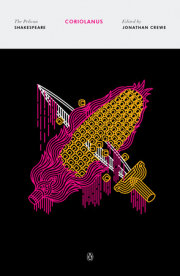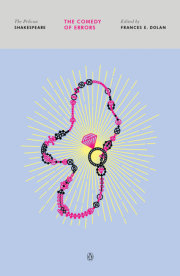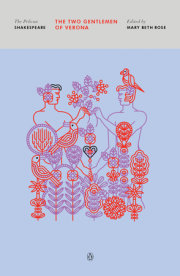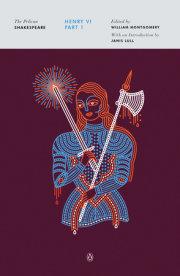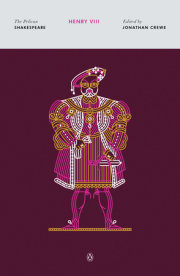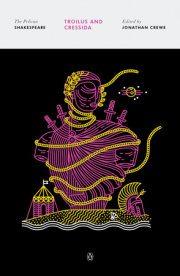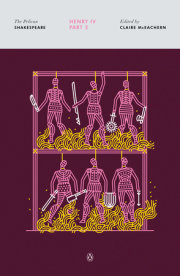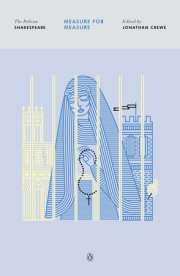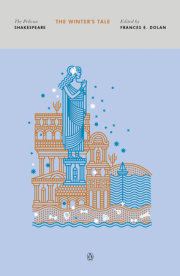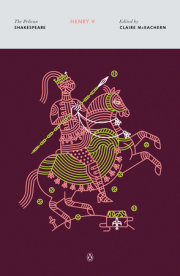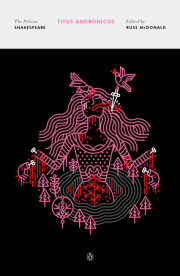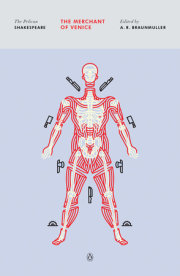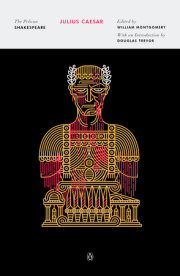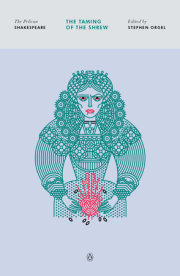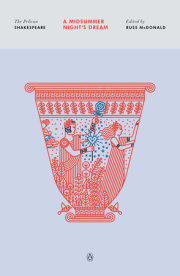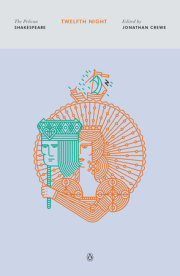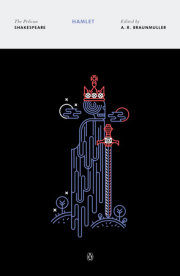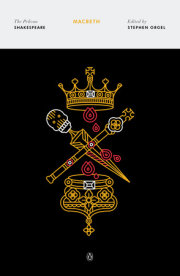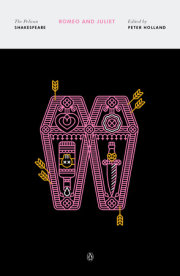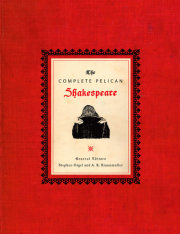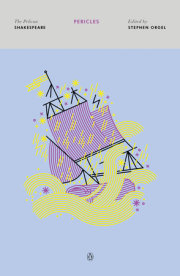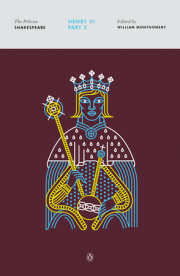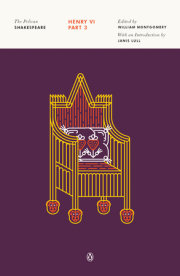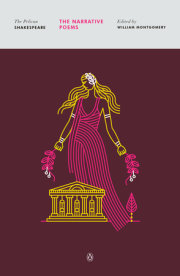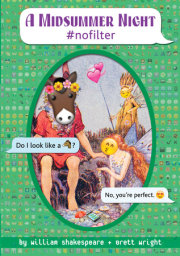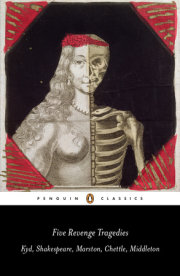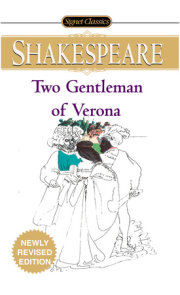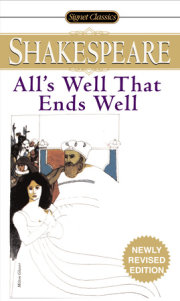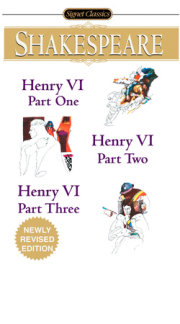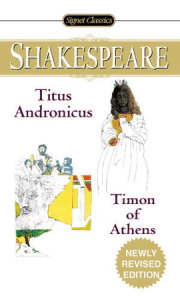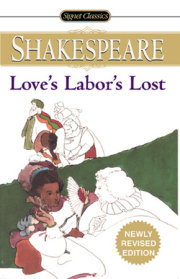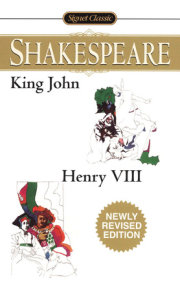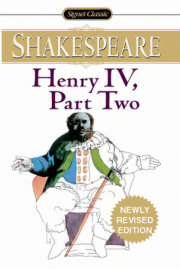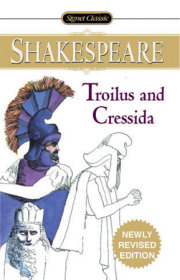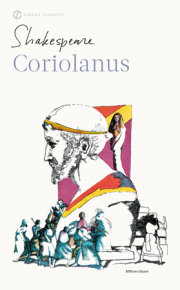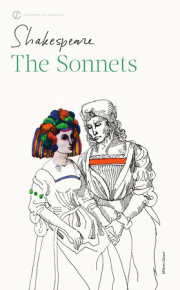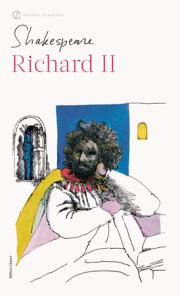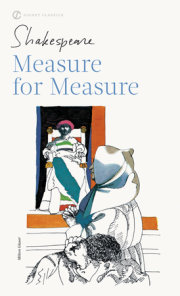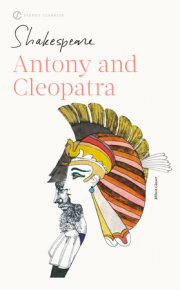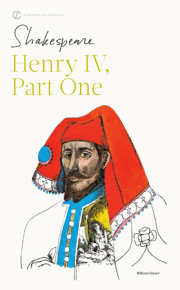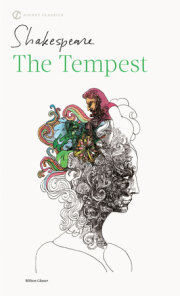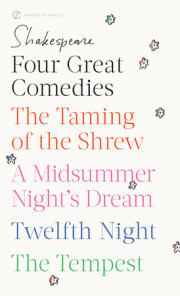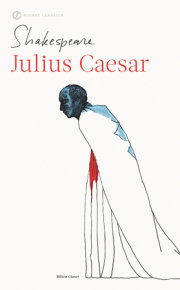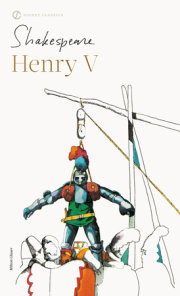The Tragedy of Coriolanus ¥ I.1 Enter a company of mutinous Citizens, with staves, clubs, and other weapons.
first citizen Before we proceed any further, hear me speak.
all Speak, speak.
first citizen You are all resolved rather to die than to famish?
all Resolved, resolved.
first citizen First, you know Caius Martius is chief enemy to the people.
all We know't, we know't.
first citizen Let us kill him, and we'll have corn at our own price. Is't a verdict?
10
11
all No more talking on't! Let it be done! Away, away!
12
second citizen One word, good citizens.
first citizen We are accounted poor citizens, the patricians good. What authority surfeits on would relieve us. If they would yield us but the superfluity while it were wholesome, we might guess they relieved us humanely, but they think we are too dear. The leanness that afflicts us, the object of our misery, is as an inventory to particularize their abundance; our sufferance is a gain to them. Let us revenge this with our pikes ere we become rakes; for the gods know I speak this in hunger for bread, not in thirst for revenge.
15
16
18
19
20
21
22
second citizen Would you proceed especially against Caius Martius?
all Against him first. He's a very dog to the commonalty.
26
second citizen Consider you what services he has done for his country?
27
first citizen Very well, and could be content to give him good report for't, but that he pays himself with being proud.
30
second citizen Nay, but speak not maliciously.
first citizen I say unto you, what he hath done famously, he did it to that end. Though soft-conscienced men can be content to say it was for his country, he did it to please his mother and to be partly proud, which he is, even to the altitude of his virtue.
35
38
second citizen What he cannot help in his nature, you account a vice in him. You must in no way say he is covetous.
40
41
first citizen If I must not, I need not be barren of accusations. He hath faults, with surplus, to tire in repetition.
Shouts within.
What shouts are these? The other side o' th' city is risen.
Why stay we prating here? To th' Capitol!
46
all Come, come!
first citizen Soft, who comes here?
48
Enter Menenius Agrippa.
second citizen Worthy Menenius Agrippa, one that hath always loved the people.
50
first citizen He's one honest enough! Would all the rest were so!
menenius
What work's, my countrymen, in hand? Where go you
With bats and clubs? The matter? Speak, I pray you.
first citizen Our business is not unknown to th' Senate. They have had inkling this fortnight what we intend to do, which now we'll show 'em in deeds. They say poor suitors have strong breaths; they shall know we have strong arms too.
58
menenius
Why, masters, my good friends, mine honest neighbors,
60
Will you undo yourselves?
first citizen We cannot, sir, we are undone already.
menenius
I tell you, friends, most charitable care
Have the patricians of you. For your wants,
64
Your suffering in this dearth, you may as well
65
Strike at the heaven with your staves as lift them
Against the Roman state, whose course will on
67
The way it takes, cracking ten thousand curbs
Of more strong link asunder than can ever
Appear in your impediment. For the dearth,
70
The gods, not the patricians, make it, and
Your knees to them, not arms, must help. Alack,
You are transported by calamity
73
Thither where more attends you, and you slander
The helms o' th' state, who care for you like fathers,
75
When you curse them as enemies.
first citizen Care for us? True, indeed! They ne'er cared for us yet: suffer us to famish, and their storehouses crammed with grain; make edicts for usury, to support usurers; repeal daily any wholesome act established against the rich, and provide more piercing statutes daily to chain up and restrain the poor. If the wars eat us not up, they will; and there's all the love they bear us.
78
79
80
81
menenius
Either you must
Confess yourselves wondrous malicious,
86
Or be accused of folly. I shall tell you
A pretty tale. It may be you have heard it,
88
But, since it serves my purpose, I will venture
To stale't a little more.
90
first citizen Well, I'll hear it, sir; yet you must not think to fob off our disgrace with a tale. But, an't please you, deliver.
92
menenius
There was a time when all the body's members
94
Rebelled against the belly, thus accused it:
That only like a gulf it did remain
I' th' midst o' th' body, idle and unactive,
Still cupboarding the viand, never bearing
98
Like labor with the rest, where th' other instruments
99
Did see and hear, devise, instruct, walk, feel,
100
And mutually participate, did minister
101
Unto the appetite and affection common
102
Of the whole body. The belly answered-
first citizen Well, sir, what answer made the belly?
menenius
Sir, I shall tell you. With a kind of smile,
Which ne'er came from the lungs, but even thus-
106
For, look you, I may make the belly smile
As well as speak-it tauntingly replied
To th' discontented members, the mutinous parts
That envied his receipt; even so most fitly
110
As you malign our senators, for that
111
They are not such as you.
112
first citizen Your belly's answer? What?
The kingly crownd head, the vigilant eye,
The counselor heart, the arm our soldier,
Our steed the leg, the tongue our trumpeter,
With other muniments and petty helps
116
In this our fabric, if that they-
menenius What then?
'Fore me, this fellow speaks! What then? what then?
118
first citizen
Should by the cormorant belly be restrained,
119
Who is the sink o' th' body-
120
menenius Well, what then?
first citizen
The former agents, if they did complain,
What could the belly answer?
menenius I will tell you,
If you'll bestow a small-of what you have little-
Patience awhile, you'st hear the belly's answer.
124
first citizen
You're long about it.
menenius Note me this, good friend;
Your most grave belly was deliberate,
126
Not rash like his accusers, and thus answered:
"True is it, my incorporate friends," quoth he,
128
"That I receive the general food at first,
Which you do live upon; and fit it is,
130
Because I am the storehouse and the shop
131
Of the whole body. But, if you do remember,
I send it through the rivers of your blood
Even to the court, the heart, to th' seat o' th' brain;
And, through the cranks and offices of man,
135
The strongest nerves and small inferior veins
136
From me receive that natural competency
137
Whereby they live. And though that all at once"-
You, my good friends! This says the belly. Mark me.
first citizen
Ay, sir, well, well.
140
menenius "Though all at once cannot
See what I do deliver out to each,
Yet I can make my audit up that all
142
From me do back receive the flour of all,
And leave me but the bran." What say you to't?
first citizen
It was an answer. How apply you this?
menenius
The senators of Rome are this good belly,
And you the mutinous members. For examine
Their counsels and their cares, disgest things rightly
148
Touching the weal o' th' common, you shall find
149
No public benefit which you receive
150
But it proceeds or comes from them to you,
And no way from yourselves. What do you think,
You, the great toe of this assembly?
first citizen
I the great toe! Why the great toe?
menenius
For that, being one o' th' lowest, basest, poorest
Of this most wise rebellion, thou goest foremost.
Thou rascal, that art worst in blood to run,
157
Lead'st first to win some vantage.
158
But make you ready your stiff bats and clubs:
Rome and her rats are at the point of battle;
160
The one side must have bale.
161
Enter Caius Martius. Hail, noble Martius!
martius
Thanks. What's the matter, you dissentious rogues,
162
That, rubbing the poor itch of your opinion,
Make yourselves scabs?
first citizen We have ever your good word.
martius
He that will give good words to thee will flatter
Beneath abhorring. What would you have, you curs,
166
That like nor peace nor war? The one affrights you,
167
The other makes you proud. He that trusts to you,
168
Where he should find you lions, finds you hares;
Where foxes, geese. You are no surer, no,
170
Than is the coal of fire upon the ice,
Or hailstone in the sun. Your virtue is
To make him worthy whose offense subdues him
173
And curse that justice did it. Who deserves greatness
174
Deserves your hate; and your affections are
A sick man's appetite, who desires most that
Which would increase his evil. He that depends
Upon your favors swims with fins of lead
And hews down oaks with rushes. Hang ye! Trust ye?
With every minute you do change a mind,
180
And call him noble that was now your hate,
Him vile that was your garland. What's the matter,
182
That in these several places of the city
183
You cry against the noble Senate, who,
Under the gods, keep you in awe, which else
Would feed on one another? What's their seeking?
186
menenius
For corn at their own rates, whereof they say
The city is well stored.
martius Hang 'em! They say?
They'll sit by th' fire and presume to know
What's done i' th' Capitol, who's like to rise,
190
Who thrives and who declines; side factions and give out
191
Conjectural marriages, making parties strong
192
And feebling such as stand not in their liking
193
Below their cobbled shoes. They say there's grain enough?
194
Would the nobility lay aside their ruth,
195
And let me use my sword, I'd make a quarry
196
With thousands of these quartered slaves as high
197
As I could pick my lance.
198
menenius
Nay, these are almost thoroughly persuaded;
For though abundantly they lack discretion,
200
Yet are they passing cowardly. But, I beseech you,
201
What says the other troop?
martius They are dissolved. Hang 'em!
They said they were anhungry, sighed forth proverbs-
203
That hunger broke stone walls, that dogs must eat,
That meat was made for mouths, that the gods sent not
Corn for the rich men only. With these shreds
206
They vented their complainings, which being answered
And a petition granted them, a strange one,
To break the heart of generosity,
209
And make bold power look pale, they threw their caps
210
As they would hang them on the horns o' th' moon,
Shouting their emulation.
212
menenius What is granted them?
martius
Five tribunes to defend their vulgar wisdoms,
213
Of their own choice. One's Junius Brutus,
Sicinius Velutus, and I know not-'Sdeath!
215
The rabble should have first unroofed the city
Ere so prevailed with me; it will in time
Win upon power, and throw forth greater themes
218
For insurrection's arguing.
219
menenius This is strange.
martius
Go, get you home, you fragments!
220
Enter a Messenger hastily.
messenger
Where's Caius Martius?
martius Here. What's the matter?
messenger
The news is, sir, the Volsces are in arms.
martius
I am glad on't. Then we shall ha' means to vent
223
Our musty superfluity. See, our best elders.
224
Enter Sicinius Velutus, Junius Brutus, Cominius, Titus Lartius, with other Senators.
first senator
Martius, 'tis true that you have lately told us:
225
The Volsces are in arms.
martius They have a leader,
Tullus Aufidius, that will put you to't.
227
I sin in envying his nobility,
And were I any thing but what I am,
I would wish me only he.
230
cominius You have fought together?
martius
Were half to half the world by th' ears and he
231
Upon my party, I'd revolt, to make
232
Only my wars with him. He is a lion
That I am proud to hunt.
first senator Then, worthy Martius,
Attend upon Cominius to these wars.
cominius
It is your former promise.
martius Sir, it is,
And I am constant. Titus Lartius, thou
Shalt see me once more strike at Tullus' face.
What, art thou stiff? Stand'st out?
239
titus No, Caius Martius,
I'll lean upon one crutch and fight with t' other,
240
Ere stay behind this business.
menenius O, true-bred!
first senator
Your company to th' Capitol, where I know
Our greatest friends attend us.
243
titus [To Cominius] Lead you on.
[To Martius]
Follow Cominius. We must follow you.
Right worthy you priority.
245
cominius Noble Martius!
first senator [To the Citizens]
Hence to your homes, be gone!
martius Nay, let them follow.
The Volsces have much corn. Take these rats thither
To gnaw their garners. Worshipful mutineers,
248
Your valor puts well forth. Pray follow.
249
Exeunt. Citizens steal away. Manent Sicinius and Brutus.
sicinius
Was ever man so proud as is this Martius?
250
brutus
He has no equal.
sicinius
When we were chosen tribunes for the people-
brutus
Marked you his lip and eyes?
sicinius Nay, but his taunts.
brutus
Being moved, he will not spare to gird the gods.
254
sicinius
Bemock the modest moon.
brutus
The present wars devour him! He is grown
Too proud to be so valiant.
sicinius Such a nature,
Tickled with good success, disdains the shadow
Which he treads on at noon. But I do wonder
His insolence can brook to be commanded
260
Under Cominius.
brutus Fame, at the which he aims,
In whom already he's well graced, cannot
262
Better be held nor more attained than by
A place below the first; for what miscarries
264
Shall be the general's fault, though he perform
To th' utmost of a man, and giddy censure
266
Will then cry out of Martius, "O, if he
Had borne the business!"
sicinius Besides, if things go well,
Opinion, that so sticks on Martius, shall
269
Of his demerits rob Cominius.
270
brutus Come.
Half all Cominius' honors are to Martius,
271
Though Martius earned them not; and all his faults
To Martius shall be honors, though indeed
In aught he merit not.
274
sicinius Let's hence and hear
How the dispatch is made, and in what fashion,
275
More than his singularity, he goes
276
Upon this present action.
brutus Let's along.Exeunt.
*
¥ I.2 Enter Tullus Aufidius, with Senators of Corioles.
first senator
So, your opinion is, Aufidius,
That they of Rome are entered in our counsels
2
And know how we proceed.
Copyright © 2018 by William Shakespeare. All rights reserved. No part of this excerpt may be reproduced or reprinted without permission in writing from the publisher.


